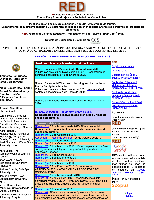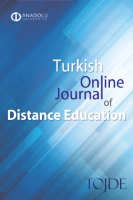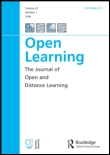
RED-Revista de Educacion a Distancia
Scope & Guideline
Elevating Pedagogy Through Scholarly Excellence
Introduction
Aims and Scopes
- Distance Education Research:
The journal emphasizes studies related to distance education methodologies, effectiveness, and innovations, exploring how technology can facilitate learning across various educational contexts. - Technology Integration in Education:
There is a strong focus on the integration of digital tools and resources in educational settings, including the use of mobile applications, virtual reality, and artificial intelligence to enhance learning outcomes. - Collaborative and Interactive Learning:
Research on collaborative learning environments, particularly in online settings, is a significant area of interest, with studies exploring how technology can foster communication and cooperation among learners. - Teacher Training and Competence Development:
The journal addresses the professional development of educators, particularly in the context of digital competencies and the adaptation of teaching strategies to new learning environments. - Educational Assessment and Evaluation:
There is a consistent focus on assessment methodologies, including the impact of digital tools on student performance and the evaluation of educational practices in distance learning.
Trending and Emerging
- Artificial Intelligence in Education:
There is a growing body of research exploring the application of artificial intelligence in educational contexts, including intelligent tutoring systems and the emotional analysis of students, highlighting its potential to personalize and enhance learning experiences. - Virtual and Augmented Reality:
The use of virtual and augmented reality in educational settings is an emerging theme, with studies examining their effectiveness in improving engagement and understanding in complex subjects such as medical education and spatial skills. - Impact of Mobile Learning Applications:
Recent publications are increasingly focusing on the role of mobile applications in education, assessing their impact on student engagement and academic performance, which reflects the trend towards mobile-friendly learning environments. - Collaborative Online Learning Models:
There is a notable increase in research on collaborative online learning frameworks and methodologies, as educators seek to harness technology to facilitate peer interaction and community building in virtual settings. - Cognitive Load and Learning Strategies:
Emerging studies are investigating cognitive load in learning environments, particularly with the integration of new technologies, emphasizing the importance of understanding how learners process information in digital contexts.
Declining or Waning
- Traditional Classroom Methods:
As the emphasis on distance education grows, traditional classroom-based teaching methods appear to be receiving less attention, with fewer papers exploring conventional pedagogical strategies. - Basic Digital Literacy:
While digital literacy remains important, there seems to be a decline in research specifically focused on basic digital skills, as the journal increasingly emphasizes advanced technological integration in education. - Static Educational Resources:
Research focusing on static resources, such as textbooks or traditional media, is less frequent, indicating a shift towards more dynamic, interactive, and technology-enhanced educational tools. - General Educational Policies:
Studies discussing general educational policies without a specific focus on technology or distance learning are becoming less common, suggesting a narrowing of the scope towards more targeted, technology-driven educational research.
Similar Journals

Computers and Education Open
Fostering collaboration in educational innovation.Computers and Education Open is a pioneering open access journal published by Elsevier that focuses on advancing the field of educational technology and digital learning methodologies. Since its inception in 2020, the journal has provided a platform for researchers, educators, and practitioners to disseminate innovative findings and share insights related to the integration of computing technologies in educational settings. With its ISSN 2666-5573, this journal aims to bridge the gap between technology and education, fostering a collaborative environment for those dedicated to enhancing learning experiences through computational tools. Leveraging the rigorous standards of Elsevier's publishing excellence, Computers and Education Open attracts high-quality research that influences pedagogical practices and educational policies globally. The open access nature of the journal ensures that valuable knowledge is freely accessible, making it an essential resource for academics and professionals looking to stay at the forefront of educational advancements.

Educar
Championing Open Access for Global KnowledgeEducar, published by the Universitat Autònoma de Barcelona, stands as a significant contributor to the fields of education, communication, and human-computer interaction. With an Open Access policy since 1982, this journal provides an invaluable platform for the dissemination of innovative research and insightful perspectives from diverse academic backgrounds. The journal boasts a commendable position in the 2023 category quartiles, ranking Q2 in Communication and Q3 in both Education and Human-Computer Interaction, which underscores its relevance and influence within these disciplines. Educar is indexed in Scopus and reflects a strong reception in the academic community, with its Social Sciences - Communication category ranked 173rd out of 511 journals, affirming its 66th percentile standing. Researchers and professionals will find this journal particularly useful for accessing a wide range of studies that not only push the boundaries of knowledge but also offer practical insights that enhance educational practices and technological engagement.

Pegem Egitim ve Ogretim Dergisi
Exploring Innovative Pedagogies in EducationPegem Egitim ve Ogretim Dergisi is a prominent academic journal published by PEGEM AKAD YAYINCILIK EGITIM DANISMANLIK HIZMETLERI TIC LTD STI, specializing in the field of education. Based in Turkey, this journal offers a platform for scholarly discourse, catering to both emerging and established researchers in the educational domain. With its ISSN 2148-239X, the journal aims to provide insights into contemporary educational practices, pedagogical innovations, and research findings that influence teaching and learning. Although classified in the Q4 quartile of the education category as of 2022 and achieving a Scopus rank of 1178 out of 1469, it remains a valuable resource for practitioners and academics alike. The journal ceased Scopus coverage in 2023, yet it continues to be a relevant outlet for educational research in Turkey and beyond. While it operates under traditional access models, the potential for collaborative research and knowledge sharing makes it a noteworthy choice for those engaged in the evolving landscape of education.

E-Learning and Digital Media
Empowering educators with cutting-edge e-learning insights.E-Learning and Digital Media, published by SAGE Publications Inc, is a premier academic journal dedicated to the innovative intersection of digital technologies and education. With a strong commitment to advancing research in the fields of education and computer science, this journal has established itself as a vital resource for researchers, professionals, and students alike. As of 2023, it proudly holds a Q2 ranking in both Computer Science Applications and Education, reflecting its impact and reach within the academic community. The journal encompasses a wide range of topics exploring the effectiveness and applications of e-learning technologies, pedagogical strategies, and digital media in educational settings. Since its inception in 2009, E-Learning and Digital Media has continuously contributed to the understanding and development of digital education, ensuring relevancy in an ever-evolving landscape. With an open access model intended to foster accessibility and dissemination of knowledge, this journal invites submissions that push the boundaries of traditional education through cutting-edge research and practice.

Turkish Online Journal of Distance Education
Fostering Global Dialogue on Educational Accessibility.Turkish Online Journal of Distance Education, a distinguished publication from ANADOLU UNIVERSITY, serves as a vital resource in the field of distance education, contributing significantly to the ongoing discourse since its inception in 2000. With an impressive impact factor that reflects its standing within the academic community, this open access journal provides an influential platform for researchers, educators, and practitioners to disseminate innovative findings and educational strategies. Ranked in the Q2 category within the education sector according to the 2023 quartile rankings, and boasting a commendable position of #423 out of 1543 in Scopus' Social Sciences Education rankings, the journal places itself firmly within the 72nd percentile of its cohort. Spanning from 2004 to 2024, the journal's commitment to advancing scholarship in distance education is reflected not only in its comprehensive articles but also in its responsive engagement with contemporary educational challenges. Positioned in Eskişehir, Turkey, this journal aims to elevate discussions surrounding online learning and contributes to the global dialogue on education accessibility and innovation.

Virtualidad Educacion y Ciencia
Unlocking Potential: The Intersection of Virtuality and EducationVirtualidad Educacion y Ciencia is a leading open-access journal published by Univ Nacl Cordoba, Centro Estudios Avanzados, dedicated to advancing the field of educational virtuality and science. With its ISSN 1853-6530, this interdisciplinary journal has been pivotal in fostering dialogue among researchers, educators, and practitioners since its inception in 2010. The journal emphasizes the integration of technology in education, aiming to explore innovative pedagogical practices and the implications of virtual learning environments. Situated in Córdoba, Argentina, it contributes to a rich landscape of global scholarship, offering researchers and professionals an avenue to disseminate their findings widely without financial barriers. The journal's commitment to high editorial standards ensures that published articles are of high impact and relevance, making it an essential resource for anyone interested in the intersection of technology and education.

Contemporary Educational Technology
Exploring the Future of Education and TechnologyContemporary Educational Technology is a premier journal published by BASTAS PUBL LTD - UK, specializing in the dynamic intersection of educational practices and technological advancements. With an E-ISSN of 1309-517X, this journal serves as a vital resource for researchers, educators, and professionals keen to explore innovative solutions and methodologies in education. Ranked in the Q2 category for both Education and Management of Technology and Innovation in 2023, Contemporary Educational Technology boasts impressive Scopus ranks, standing at #187 out of 1543 in the Social Sciences Education field, reflecting its influence and contribution to contemporary research. Through its open-access approach, this journal facilitates the dissemination of knowledge, making cutting-edge research readily available to a global audience. By examining developments from 2018 through 2024, it aims to critically analyze and promote the integration of technology in educational contexts, thereby fostering improved learning outcomes and innovative teaching practices.

Technology Knowledge and Learning
Advancing the Intersection of Technology and EducationTechnology Knowledge and Learning, published by SPRINGER, stands as a pivotal platform in the realms of computational theory, computer science, education, and human-computer interaction. With an impressive impact factor reflecting its reputation, this journal has consistently ranked in the Q1 quartile across multiple categories as of 2023, including Computational Theory and Mathematics, Education, and Engineering. Spanning a timeline from 2011 to 2024, it serves as an essential resource for those engaged in exploring the intersections of technology, pedagogy, and knowledge transfer, thereby facilitating advancements in both theory and practical applications. Although it is not an open-access journal, the rigorous peer-review process ensures that only the highest quality research contributes to its esteemed reputation. By providing a platform for innovative research and discussions, Technology Knowledge and Learning plays a crucial role in shaping the future of technological education and applications, making it an invaluable resource for researchers, professionals, and students alike, seeking to stay at the forefront of this dynamic field.

Open Learning
Transforming Learning Through Open DialogueOpen Learning, published by Routledge Journals, Taylor & Francis Ltd, is a leading peer-reviewed journal in the field of education and e-learning, showcasing innovative research and practice since its inception in 1970. With a robust impact factor and consistently ranked in the Q1 category for both education and e-learning by Scopus, this esteemed journal positions itself at the forefront of academic dialogue, exploring the evolving landscape of digital and open learning environments. The journal's authoritative content and empirical studies serve as essential resources for researchers, educators, and students striving to enhance pedagogical strategies and educational outcomes in a rapidly changing technological world. Published quarterly, Open Learning remains committed to cultivating scholarly exchange and advancing knowledge within the global education community.

EDUCATIONAL TECHNOLOGY & SOCIETY
Advancing Knowledge in Educational Technology for a Better TomorrowEDUCATIONAL TECHNOLOGY & SOCIETY is a prestigious, peer-reviewed journal dedicated to advancing the fields of educational technology and its societal implications. Published by the International Forum on Educational Technology and Society at National Taiwan Normal University, this journal has established itself as a transformative platform for research and innovation in education, e-learning, and engineering. With a commendable impact factor reflected in its Q1 quartile rankings across multiple categories, including Education and Sociology, this journal is recognized for its rigorous scholarship and impactful contributions, ranking in the top percentiles within its respective fields. Since its transition to Open Access in 1998, EDUCATIONAL TECHNOLOGY & SOCIETY has provided an invaluable resource for researchers, educators, and policymakers, facilitating the dissemination of cutting-edge research that drives progress in educational practices globally. Whether you are a seasoned researcher or a dedicated student, this journal fosters a vibrant academic community committed to exploring innovative approaches in educational technology.